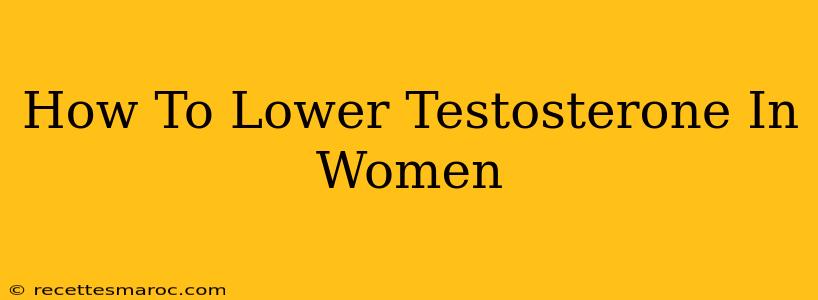High testosterone levels in women, also known as hyperandrogenism, can cause a range of unpleasant symptoms. Understanding the causes and effective management strategies is crucial for improving overall well-being. This comprehensive guide explores natural and medical approaches to lower testosterone in women.
Understanding High Testosterone in Women
Before diving into treatment options, it's essential to grasp the underlying causes of elevated testosterone. Several factors can contribute to high testosterone levels in women, including:
- Polycystic Ovary Syndrome (PCOS): This hormonal disorder is a common cause of high testosterone, often leading to irregular periods, acne, and weight gain.
- Congenital Adrenal Hyperplasia (CAH): A rare genetic condition affecting the adrenal glands, leading to excessive androgen production.
- Ovarian or Adrenal Tumors: These tumors can produce excessive androgens, impacting hormone balance.
- Cushing's Syndrome: This condition involves excessive cortisol production, which can also affect androgen levels.
- Certain Medications: Some medications, such as anabolic steroids, can elevate testosterone levels.
- Obesity: Excess weight can disrupt hormonal balance and contribute to higher testosterone.
Recognizing the Symptoms
Recognizing the symptoms of high testosterone is crucial for early intervention. Common signs include:
- Irregular or absent menstrual periods: This is a very common indicator.
- Acne and oily skin: Androgens stimulate sebaceous glands, leading to breakouts.
- Excessive hair growth (hirsutism): This can manifest on the face, chest, back, and abdomen.
- Male-pattern baldness: Hair thinning and loss can occur.
- Weight gain: Often concentrated in the abdomen.
- Increased muscle mass: While not always negative, it can be a symptom.
- Decreased breast size: Testosterone can negatively impact breast tissue.
- Deepening voice: A noticeable change in vocal pitch.
- Reduced fertility: High testosterone can interfere with ovulation.
Lowering Testosterone Levels: Treatment Approaches
The approach to lowering testosterone depends on the underlying cause and the severity of symptoms. Here's a breakdown of treatment options:
1. Lifestyle Modifications
Often, lifestyle changes are the first line of defense, particularly for mild cases or in conjunction with medical treatment.
- Weight Management: Losing even a moderate amount of weight can significantly improve hormone balance.
- Diet: A balanced diet rich in fruits, vegetables, and lean protein can support hormone regulation. Avoid processed foods, sugary drinks, and excessive saturated fats.
- Exercise: Regular physical activity, especially aerobic exercise, can help improve insulin sensitivity and reduce androgen levels.
2. Medical Interventions
For moderate to severe cases, medical interventions may be necessary. These options include:
- Birth Control Pills: These can help regulate hormone levels and alleviate some symptoms.
- Anti-androgen Medications: These medications directly block the effects of androgens.
- Metformin: This medication, commonly used to treat type 2 diabetes, can also improve insulin sensitivity and help regulate hormone levels, particularly in women with PCOS.
- Surgery: In cases of tumors, surgery may be necessary to remove the source of excess androgens.
Natural Approaches (Consult Your Doctor Before Trying)
While lifestyle changes and medical treatments are the most effective methods, some natural approaches may offer supplementary support. Always consult your doctor before attempting any natural remedies, as they may interact with medications or worsen underlying conditions. Potential options, that should only be considered with a doctor's guidance, include:
- Certain herbal supplements: Some herbs have purported anti-androgenic effects, but their efficacy and safety require further research.
- Dietary changes: Focusing on specific nutrients may assist with hormone balance, but requires professional guidance.
Disclaimer: This information is intended for educational purposes only and does not constitute medical advice. It's essential to consult with a healthcare professional for diagnosis and treatment of high testosterone levels in women. They can conduct appropriate tests, determine the underlying cause, and recommend the most suitable and safe treatment plan for your individual needs. Never self-treat hormonal imbalances.

